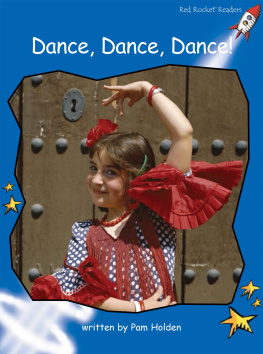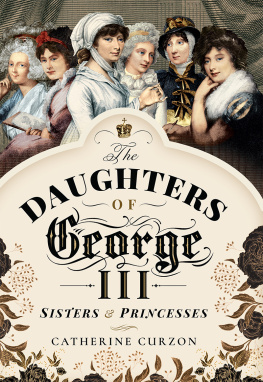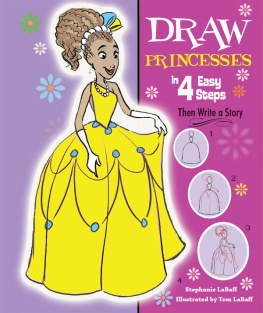Dragon Slippers
Dragon Flight
Dragon Spear
Sun and Moon, Ice and Snow
Princess
of the
Midnight
Ball
Jessica Day George

Copyright 2009 by Jessica Day George
All rights reserved. No part of this book may be used or reproduced in any manner
whatsoever without written permission from the publisher, except in the case of brief
quotations embodied in critical articles or reviews.
First published in the United States of America in February 2009
by Bloomsbury Books for Young Readers
E-book edition published in February 2011
www.bloomsburyteens.com
For information about permission to reproduce selections from this book, write to
Permissions, Bloomsbury BFYR, 175 Fifth Avenue, New York, New York 10010
The Library of Congress has cataloged the hardcover edition as follows:
George, Jessica Day.
Princess of the Midnight Ball / by Jessica Day George. 1st U.S. ed.
p. cm.
Summary: A retelling of the tale of twelve princesses who wear out their shoes dancing
every night, and of Galen, a former soldier now working in the kings gardens, who
follows them in hopes of breaking the curse.
ISBN-13: 978-1-59990-322-4 ISBN-10: 1-59990-322-9
[1. Fairy tales. 2. PrincessesFiction. 3. DancingFiction. 4. SoldiersFiction. 5. MagicFiction.
6. Blessing and cursingFiction.] I. Title.
PZ8.G3295Pri 2009 [Fic]dc22 2008030310
ISBN 978-1-59990-772-7 (e-book)
For Jenn
Finally

Contents
Because he had once been human, the King Under Stone sometimes found himself plagued by human emotions. He was experiencing one now, as he faced the mortal woman before him, but it took a moment for him to give it a name. After a pause he labeled it triumph.
Do you understand our bargain? The king had a voice like a steel blade breaking on stone.
I do. The human queens voice was steady. Twelve years will I dance for you here below, and in return Westfalin shall be victorious.
Let us not forget the years you still owe me, the king said. Our first bargain is not yet fulfilled.
I know. She bowed her head in weariness. There were dark circles beneath her eyes and gray in her hair though she was a young woman still.
The King Under Stone stretched out his long white hand and lifted her chin. What a pity your daughters do not join you at our little fetes, he said. Such lovely girls, I am sure. And my twelve sons are pining for companionship. Again the feeling of triumph: the idea of these mortal girls dancing with his sons. There had always been the little problem, as his sons grew older, of where to find them brides.
Beautiful brides who could walk in the sun.
And then this mortal queen had come to him, begging for aid in bearing children with her fat, foolish husband. She had borne seven daughters so far, and once she had borne a dozen, Under Stone had decided that he would find a way to bring the girls below to meet their future husbands.
A look of horror spread across the queens face at his suggestion. My d-daughters are s-sweet, honorable girls, she stuttered. And young. Too young to be married!
Ah, but my sons are young, and their dear mothers were all sweet, honorable women, just like yourself and your little daughters! And my princes do long for companions of their own kind. Each of Under Stones sons had been born to a mortal woman, and he wanted their wives to be mortal as well. The King Under Stone brushed back a stray curl of the queens hair.
She drew back. Are we finished? I must go the children my husband.
Yes, yes. He waved a long hand. Our bargain is made. You may go.
She turned and hurried away. Away from the black palace on the shadowy shore. A silent figure, cloaked and hooded, rowed her across the sunless lake in a silver filagree boat and escorted her to the gate that led to the sunlight world.
The King Under Stone smiled as he watched Queen Maude hurry away. She would be back. She had to come back, every week. But that was not what made him smile. She had concealed her condition for quite some time, but as she settled into the boat it became apparent that the human queen was expecting her eighth child, precisely on schedule.
Another precious little princess for her and her darling Gregor, Under Stone said, the cold semblance of human feeling just barely tingeing his voice. And another beautiful bride for one of my sons.

Exhausted almost beyond the point of thought, Galen nevertheless kept moving forward, alone in the middle of the dusty road. In his head he sang the marching song of his old regiment, but his feet stumbled more than they marched.
Left, left, left, left, left my wife and children too! Did I do right, right, right, right, right?
He laughed a little to himself. He was not quite nineteen years old, and he had spent most of his life on the battlefield. He had no wife or children to leave, only filthy tents, bad food, and death. Before him lay the endless road, dust, thirst, and life. Or so he hoped.
He drank the last swig of water from his canteen, hung it back on his belt, and stumbled on. The wind bit through his worn soldiers coat; winter was coming.
All around him were fields that had lain fallow for years. In one, turnips that some hopeful family had planted had rotted in the earth with no one to harvest them. In another, the weeds were as tall as Galen. A cow and her calf were feasting there, and Galen veered from his path, taking a step toward them. They looked abandoned, so no one would mind if he filled his canteen with milk. But when he took a second step in their direction, the cow lowed with alarm and trotted away, her calf at her heels. She had been running wild for too long to suffer being milked.
With a sigh, Galen continued on. Every so often he came across other soldiers heading home. He would share a meager meal and camp with them overnight, walking for a while the next morning in the familiar company of other exhausted fighting men in blue tunics. But Galen never stayed with these other soldiers for long, something that they found very odd. It was said that in the heat of battle strangers became brothers and the bond was not severed by death or distance. Galen had never felt that way, though. He had seen his first battle when he was seven years old, had helped his mother care for the wounded and watched her wash enemy blood out of his fathers uniform afterward. To Galen, war was a disease, something to be avoided, not something he wanted to talk about with other afflicted men over the campfire.
Sometimes women or men too old to join the fight would offer him a ride in their cart. They often wanted to know if he had met their son or husband during the war. It was rare that he had: the army was vast, and Galens regiment had been from the city of Isen, far from these fields and forests.
Galen told people what he could, making light of the conditions the soldiers had lived in and celebrating with them over the end of the war. Westfalin had defeated the Analousians at last, but it was a grim victory. After twelve years at war, the country was deeply in debt to her allies, and many soldiers would not be returning home. Or, like Galen, they no longer had a home to return to.
The son of a soldier and an army laundress, Galen had been born in a cottage that looked out on the training grounds where his father marched in drills all day long. When he was six, the Analousians had attacked, and Galens fathers regiment had been sent to the front lines. His mother, the daughter of a soldier herself, had packed up Galen and his baby sister and joined the supply train. She had scrubbed blue tunics and darned gray socks right up until the day the lung sicknessa gift of the damp and coldhad claimed her life. Galens little sister, Ilsa, had also suffered from lung sickness. She had recovered, but her breath often came short, and so she had ridden on the supply wagons during the marches. She was killed when the wagon she was riding slipped off a steep mountain road in the rain and fell into the river below.
Next page












